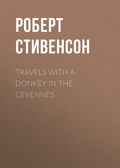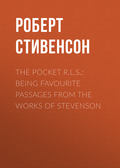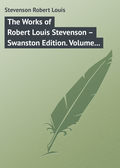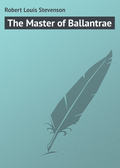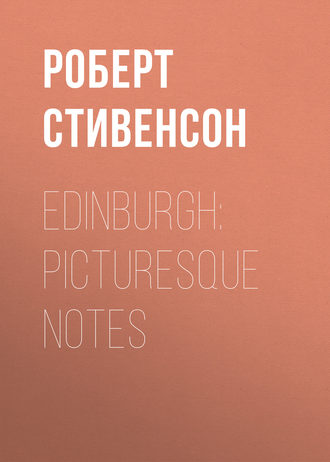
Роберт Льюис Стивенсон
Edinburgh: Picturesque Notes
CHAPTER VIII. THE CALTON HILL
The east of new Edinburgh is guarded by a craggy hill, of no great elevation, which the town embraces. The old London road runs on one side of it; while the New Approach, leaving it on the other hand, completes the circuit. You mount by stairs in a cutting of the rock to find yourself in a field of monuments. Dugald Stewart has the honours of situation and architecture; Burns is memorialised lower down upon a spur; Lord Nelson, as befits a sailor, gives his name to the top-gallant of the Calton Hill. This latter erection has been differently and yet, in both cases, aptly compared to a telescope and a butter-churn; comparisons apart, it ranks among the vilest of men’s handiworks. But the chief feature is an unfinished range of columns, ‘the Modern Ruin’ as it has been called, an imposing object from far and near, and giving Edinburgh, even from the sea, that false air; of a Modern Athens which has earned for her so many slighting speeches. It was meant to be a National Monument; and its present state is a very suitable monument to certain national characteristics. The old Observatory – a quaint brown building on the edge of the steep – and the new Observatory – a classical edifice with a dome – occupy the central portion of the summit. All these are scattered on a green turf, browsed over by some sheep.
The scene suggests reflections on fame and on man’s injustice to the dead. You see Dugald Stewart rather more handsomely commemorated than Burns. Immediately below, in the Canongate churchyard, lies Robert Fergusson, Burns’s master in his art, who died insane while yet a stripling; and if Dugald Stewart has been somewhat too boisterously acclaimed, the Edinburgh poet, on the other hand, is most unrighteously forgotten. The votaries of Burns, a crew too common in all ranks in Scotland and more remarkable for number than discretion, eagerly suppress all mention of the lad who handed to him the poetic impulse and, up to the time when he grew famous, continued to influence him in his manner and the choice of subjects. Burns himself not only acknowledged his debt in a fragment of autobiography, but erected a tomb over the grave in Canongate churchyard. This was worthy of an artist, but it was done in vain; and although I think I have read nearly all the biographies of Burns, I cannot remember one in which the modesty of nature was not violated, or where Fergusson was not sacrificed to the credit of his follower’s originality. There is a kind of gaping admiration that would fain roll Shakespeare and Bacon into one, to have a bigger thing to gape at; and a class of men who cannot edit one author without disparaging all others. They are indeed mistaken if they think to please the great originals; and whoever puts Fergusson right with fame, cannot do better than dedicate his labours to the memory of Burns, who will be the best delighted of the dead.
Of all places for a view, this Calton Hill is perhaps the best; since you can see the Castle, which you lose from the Castle, and Arthur’s Seat, which you cannot see from Arthur’s Seat. It is the place to stroll on one of those days of sunshine and east wind which are so common in our more than temperate summer. The breeze comes off the sea, with a little of the freshness, and that touch of chill, peculiar to the quarter, which is delightful to certain very ruddy organizations and greatly the reverse to the majority of mankind. It brings with it a faint, floating haze, a cunning decolourizer, although not thick enough to obscure outlines near at hand. But the haze lies more thickly to windward at the far end of Musselburgh Bay; and over the Links of Aberlady and Berwick Law and the hump of the Bass Rock it assumes the aspect of a bank of thin sea fog.
Immediately underneath upon the south, you command the yards of the High School, and the towers and courts of the new Jail – a large place, castellated to the extent of folly, standing by itself on the edge of a steep cliff, and often joyfully hailed by tourists as the Castle. In the one, you may perhaps see female prisoners taking exercise like a string of nuns; in the other, schoolboys running at play and their shadows keeping step with them. From the bottom of the valley, a gigantic chimney rises almost to the level of the eye, a taller and a shapelier edifice than Nelson’s Monument. Look a little farther, and there is Holyrood Palace, with its Gothic frontal and ruined abbey, and the red sentry pacing smartly too and fro before the door like a mechanical figure in a panorama. By way of an outpost, you can single out the little peak-roofed lodge, over which Rizzio’s murderers made their escape and where Queen Mary herself, according to gossip, bathed in white wine to entertain her loveliness. Behind and overhead, lie the Queen’s Park, from Muschat’s Cairn to Dumbiedykes, St. Margaret’s Loch, and the long wall of Salisbury Crags: and thence, by knoll and rocky bulwark and precipitous slope, the eye rises to the top of Arthur’s Seat, a hill for magnitude, a mountain in virtue of its bold design. This upon your left. Upon the right, the roofs and spires of the Old Town climb one above another to where the citadel prints its broad bulk and jagged crown of bastions on the western sky. – Perhaps it is now one in the afternoon; and at the same instant of time, a ball rises to the summit of Nelson’s flagstaff close at hand, and, far away, a puff of smoke followed by a report bursts from the half-moon battery at the Castle. This is the time-gun by which people set their watches, as far as the sea coast or in hill farms upon the Pentlands. – To complete the view, the eye enfilades Princes Street, black with traffic, and has a broad look over the valley between the Old Town and the New: here, full of railway trains and stepped over by the high North Bridge upon its many columns, and there, green with trees and gardens.
On the north, the Calton Hill is neither so abrupt in itself nor has it so exceptional an outlook; and yet even here it commands a striking prospect. A gully separates it from the New Town. This is Greenside, where witches were burned and tournaments held in former days. Down that almost precipitous bank, Bothwell launched his horse, and so first, as they say, attracted the bright eyes of Mary. It is now tesselated with sheets and blankets out to dry, and the sound of people beating carpets is rarely absent. Beyond all this, the suburbs run out to Leith; Leith camps on the seaside with her forest of masts; Leith roads are full of ships at anchor; the sun picks out the white pharos upon Inchkeith Island; the Firth extends on either hand from the Ferry to the May; the towns of Fifeshire sit, each in its bank of blowing smoke, along the opposite coast; and the hills enclose the view, except to the farthest east, where the haze of the horizon rests upon the open sea. There lies the road to Norway: a dear road for Sir Patrick Spens and his Scots Lords; and yonder smoke on the hither side of Largo Law is Aberdour, from whence they sailed to seek a queen for Scotland.
‘O lang, lang, may the ladies sit,
Wi’ their fans into their hand,
Or ere they see Sir Patrick Spens
Come sailing to the land!’
The sight of the sea, even from a city, will bring thoughts of storm and sea disaster. The sailors’ wives of Leith and the fisherwomen of Cockenzie, not sitting languorously with fans, but crowding to the tail of the harbour with a shawl about their ears, may still look vainly for brave Scotsmen who will return no more, or boats that have gone on their last fishing. Since Sir Patrick sailed from Aberdour, what a multitude have gone down in the North Sea! Yonder is Auldhame, where the London smack went ashore and wreckers cut the rings from ladies’ fingers; and a few miles round Fife Ness is the fatal Inchcape, now a star of guidance; and the lee shore to the east of the Inchcape, is that Forfarshire coast where Mucklebackit sorrowed for his son.
These are the main features of the scene roughly sketched. How they are all tilted by the inclination of the ground, how each stands out in delicate relief against the rest, what manifold detail, and play of sun and shadow, animate and accentuate the picture, is a matter for a person on the spot, and turning swiftly on his heels, to grasp and bind together in one comprehensive look. It is the character of such a prospect, to be full of change and of things moving. The multiplicity embarrasses the eye; and the mind, among so much, suffers itself to grow absorbed with single points. You remark a tree in a hedgerow, or follow a cart along a country road. You turn to the city, and see children, dwarfed by distance into pigmies, at play about suburban doorsteps; you have a glimpse upon a thoroughfare where people are densely moving; you note ridge after ridge of chimney-stacks running downhill one behind another, and church spires rising bravely from the sea of roofs. At one of the innumerable windows, you watch a figure moving; on one of the multitude of roofs, you watch clambering chimney-sweeps. The wind takes a run and scatters the smoke; bells are heard, far and near, faint and loud, to tell the hour; or perhaps a bird goes dipping evenly over the housetops, like a gull across the waves. And here you are in the meantime, on this pastoral hillside, among nibbling sheep and looked upon by monumental buildings.
Return thither on some clear, dark, moonless night, with a ring of frost in the air, and only a star or two set sparsedly in the vault of heaven; and you will find a sight as stimulating as the hoariest summit of the Alps. The solitude seems perfect; the patient astronomer, flat on his back under the Observatory dome and spying heaven’s secrets, is your only neighbour; and yet from all round you there come up the dull hum of the city, the tramp of countless people marching out of time, the rattle of carriages and the continuous keen jingle of the tramway bells. An hour or so before, the gas was turned on; lamplighters scoured the city; in every house, from kitchen to attic, the windows kindled and gleamed forth into the dusk. And so now, although the town lies blue and darkling on her hills, innumerable spots of the bright element shine far and near along the pavements and upon the high facades. Moving lights of the railway pass and repass below the stationary lights upon the bridge. Lights burn in the jail. Lights burn high up in the tall lands and on the Castle turrets, they burn low down in Greenside or along the Park. They run out one beyond the other into the dark country. They walk in a procession down to Leith, and shine singly far along Leith Pier. Thus, the plan of the city and her suburbs is mapped out upon the ground of blackness, as when a child pricks a drawing full of pinholes and exposes it before a candle; not the darkest night of winter can conceal her high station and fanciful design; every evening in the year she proceeds to illuminate herself in honour of her own beauty; and as if to complete the scheme – or rather as if some prodigal Pharaoh were beginning to extend to the adjacent sea and country – half-way over to Fife, there is an outpost of light upon Inchkeith, and far to seaward, yet another on the May.
And while you are looking, across upon the Castle Hill, the drums and bugles begin to recall the scattered garrison; the air thrills with the sound; the bugles sing aloud; and the last rising flourish mounts and melts into the darkness like a star: a martial swan-song, fitly rounding in the labours of the day.
CHAPTER IX. WINTER AND NEW YEAR
The Scotch dialect is singularly rich in terms of reproach against the winter wind. Snell, blae, nirly, and scowthering, are four of these significant vocables; they are all words that carry a shiver with them; and for my part, as I see them aligned before me on the page, I am persuaded that a big wind comes tearing over the Firth from Burntisland and the northern hills; I think I can hear it howl in the chimney, and as I set my face northwards, feel its smarting kisses on my cheek. Even in the names of places there is often a desolate, inhospitable sound; and I remember two from the near neighbourhood of Edinburgh, Cauldhame and Blaw-weary, that would promise but starving comfort to their inhabitants. The inclemency of heaven, which has thus endowed the language of Scotland with words, has also largely modified the spirit of its poetry. Both poverty and a northern climate teach men the love of the hearth and the sentiment of the family; and the latter, in its own right, inclines a poet to the praise of strong waters. In Scotland, all our singers have a stave or two for blazing fires and stout potations: – to get indoors out of the wind and to swallow something hot to the stomach, are benefits so easily appreciated where they dwelt!
And this is not only so in country districts where the shepherd must wade in the snow all day after his flock, but in Edinburgh itself, and nowhere more apparently stated than in the works of our Edinburgh poet, Fergusson. He was a delicate youth, I take it, and willingly slunk from the robustious winter to an inn fire-side. Love was absent from his life, or only present, if you prefer, in such a form that even the least serious of Burns’s amourettes was ennobling by comparison; and so there is nothing to temper the sentiment of indoor revelry which pervades the poor boy’s verses. Although it is characteristic of his native town, and the manners of its youth to the present day, this spirit has perhaps done something to restrict his popularity. He recalls a supper-party pleasantry with something akin to tenderness; and sounds the praises of the act of drinking as if it were virtuous, or at least witty, in itself. The kindly jar, the warm atmosphere of tavern parlours, and the revelry of lawyers’ clerks, do not offer by themselves the materials of a rich existence. It was not choice, so much as an external fate, that kept Fergusson in this round of sordid pleasures. A Scot of poetic temperament, and without religious exaltation, drops as if by nature into the public-house. The picture may not be pleasing; but what else is a man to do in this dog’s weather?
To none but those who have themselves suffered the thing in the body, can the gloom and depression of our Edinburgh winter be brought home. For some constitutions there is something almost physically disgusting in the bleak ugliness of easterly weather; the wind wearies, the sickly sky depresses them; and they turn back from their walk to avoid the aspect of the unrefulgent sun going down among perturbed and pallid mists. The days are so short that a man does much of his business, and certainly all his pleasure, by the haggard glare of gas lamps. The roads are as heavy as a fallow. People go by, so drenched and draggle-tailed that I have often wondered how they found the heart to undress. And meantime the wind whistles through the town as if it were an open meadow; and if you lie awake all night, you hear it shrieking and raving overhead with a noise of shipwrecks and of falling houses. In a word, life is so unsightly that there are times when the heart turns sick in a man’s inside; and the look of a tavern, or the thought of the warm, fire-lit study, is like the touch of land to one who has been long struggling with the seas.
As the weather hardens towards frost, the world begins to improve for Edinburgh people. We enjoy superb, sub-arctic sunsets, with the profile of the city stamped in indigo upon a sky of luminous green. The wind may still be cold, but there is a briskness in the air that stirs good blood. People do not all look equally sour and downcast. They fall into two divisions: one, the knight of the blue face and hollow paunch, whom Winter has gotten by the vitals; the other well lined with New-year’s fare, conscious of the touch of cold on his periphery, but stepping through it by the glow of his internal fires. Such an one I remember, triply cased in grease, whom no extremity of temperature could vanquish. ‘Well,’ would be his jovial salutation, ‘here’s a sneezer!’ And the look of these warm fellows is tonic, and upholds their drooping fellow-townsmen. There is yet another class who do not depend on corporal advantages, but support the winter in virtue of a brave and merry heart. One shivering evening, cold enough for frost but with too high a wind, and a little past sundown, when the lamps were beginning to enlarge their circles in the growing dusk, a brace of barefoot lassies were seen coming eastward in the teeth of the wind. If the one was as much as nine, the other was certainly not more than seven. They were miserably clad; and the pavement was so cold, you would have thought no one could lay a naked foot on it unflinching. Yet they came along waltzing, if you please, while the elder sang a tune to give them music. The person who saw this, and whose heart was full of bitterness at the moment, pocketed a reproof which has been of use to him ever since, and which he now hands on, with his good wishes, to the reader.
At length, Edinburgh, with her satellite hills and all the sloping country, are sheeted up in white. If it has happened in the dark hours, nurses pluck their children out of bed and run with them to some commanding window, whence they may see the change that has been worked upon earth’s face. ‘A’ the hills are covered wi’ snaw,’ they sing, ‘and Winter’s noo come fairly!’ And the children, marvelling at the silence and the white landscape, find a spell appropriate to the season in the words. The reverberation of the snow increases the pale daylight, and brings all objects nearer the eye. The Pentlands are smooth and glittering, with here and there the black ribbon of a dry-stone dyke, and here and there, if there be wind, a cloud of blowing snow upon a shoulder. The Firth seems a leaden creek, that a man might almost jump across, between well-powdered Lothian and well-powdered Fife. And the effect is not, as in other cities, a thing of half a day; the streets are soon trodden black, but the country keeps its virgin white; and you have only to lift your eyes and look over miles of country snow. An indescribable cheerfulness breathes about the city; and the well-fed heart sits lightly and beats gaily in the – bosom. It is New-year’s weather.
New-year’s Day, the great national festival, is a time of family expansions and of deep carousal. Sometimes, by a sore stoke of fate for this Calvinistic people, the year’s anniversary fails upon a Sunday, when the public-houses are inexorably closed, when singing and even whistling is banished from our homes and highways, and the oldest toper feels called upon to go to church. Thus pulled about, as if between two loyalties, the Scotch have to decide many nice cases of conscience, and ride the marches narrowly between the weekly and the annual observance. A party of convivial musicians, next door to a friend of mine, hung suspended in this manner on the brink of their diversions. From ten o’clock on Sunday night, my friend heard them tuning their instruments: and as the hour of liberty drew near, each must have had his music open, his bow in readiness across the fiddle, his foot already raised to mark the time, and his nerves braced for execution; for hardly had the twelfth stroke sounded from the earliest steeple, before they had launced forth into a secular bravura.
Currant-loaf is now popular eating in all house-holds. For weeks before the great morning, confectioners display stacks of Scotch bun – a dense, black substance, inimical to life – and full moons of shortbread adorned with mottoes of peel or sugar-plum, in honour of the season and the family affections. ‘Frae Auld Reekie,’ ‘A guid New Year to ye a’,’ ‘For the Auld Folk at Hame,’ are among the most favoured of these devices. Can you not see the carrier, after half-a-day’s journey on pinching hill-roads, draw up before a cottage in Teviotdale, or perhaps in Manor Glen among the rowans, and the old people receiving the parcel with moist eyes and a prayer for Jock or Jean in the city? For at this season, on the threshold of another year of calamity and stubborn conflict, men feel a need to draw closer the links that unite them; they reckon the number of their friends, like allies before a war; and the prayers grow longer in the morning as the absent are recommended by name into God’s keeping.
On the day itself, the shops are all shut as on a Sunday; only taverns, toyshops, and other holiday magazines, keep open doors. Every one looks for his handsel. The postman and the lamplighters have left, at every house in their districts, a copy of vernacular verses, asking and thanking in a breath; and it is characteristic of Scotland that these verses may have sometimes a touch of reality in detail or sentiment and a measure of strength in the handling. All over the town, you may see comforter’d schoolboys hasting to squander their half-crowns. There are an infinity of visits to be paid; all the world is in the street, except the daintier classes; the sacramental greeting is heard upon all sides; Auld Lang Syne is much in people’s mouths; and whisky and shortbread are staple articles of consumption. From an early hour a stranger will be impressed by the number of drunken men; and by afternoon drunkenness has spread to the women. With some classes of society, it is as much a matter of duty to drink hard on New-year’s Day as to go to church on Sunday. Some have been saving their wages for perhaps a month to do the season honour. Many carry a whisky-bottle in their pocket, which they will press with embarrassing effusion on a perfect stranger. It is inexpedient to risk one’s body in a cab, or not, at least, until after a prolonged study of the driver. The streets, which are thronged from end to end, become a place for delicate pilotage. Singly or arm-in-arm, some speechless, others noisy and quarrelsome, the votaries of the New Year go meandering in and out and cannoning one against another; and now and again, one falls and lies as he has fallen. Before night, so many have gone to bed or the police office, that the streets seem almost clearer. And as guisards and first-footers are now not much seen except in country places, when once the New Year has been rung in and proclaimed at the Tron railings, the festivities begin to find their way indoors and something like quiet returns upon the town. But think, in these piled lands, of all the senseless snorers, all the broken heads and empty pockets!



